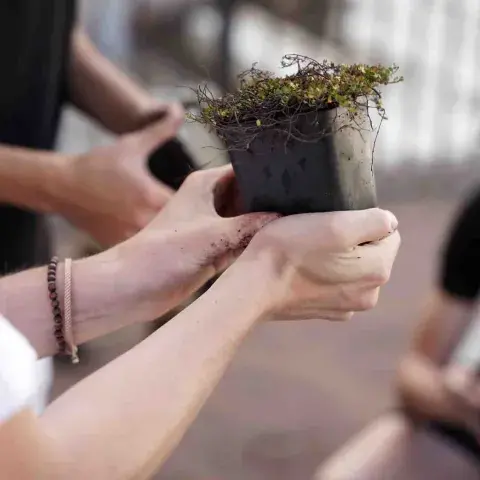
“Don’t forget to wear comfortable clothes to class tomorrow – especially ones you don’t mind getting dirty,” the Professor says. Most psychology classes don’t involve gardening, but this class is different. Today Professor Lori Montross, Franklin's new Nora McNeely Hurley Associate Professor of Psychology, will be taking her first-year students outside.
The students are all part of the First-Year Seminar entitled, "Harnessing Happiness: The power of positive psychology in everyday life", which explores how happiness is defined and experienced differently around the world. The topic seems fitting given the students themselves are from five different countries spanning four continents, yet all of them have now chosen to study in Switzerland – currently ranked as the 4th Happiest Country in the world. Although the students are only a few weeks into their first semester, they are quickly gaining a personal understanding of how happiness is built on the foundations of trust, safety, and a sense of community.
“But what does gardening have to do with happiness?” one student asked. Turns out, the students in the class read how gardening offers a wealth of psychological and health benefits. They then spent class time engaged in a biopsychosocial analysis of the recent hot-pink micropark and how it has been beneficial for people of all ages in Hong Kong.
Granted, Hong Kong is a long way from Switzerland, so Professor Montross thought “What better way to have students experience the beneficial effects of gardening than to get them outside in their own backyard?” And that’s what they did on Tuesday, September 27, during class time in the afternoon.
The class helped plant more than 24 types of lush local flora in the naturally terraced slopes of New Building C, named the "Garden of Light". Under the direction of Hortensia Garden Design’s expert landscapers, the students dug in and helped shape this new garden generously sponsored and envisioned by Nora McNeely Hurley '81.
At the end of the day, the students were asked to share their reactions. Their enthusiastic responses revealed how the event not only allowed them to peacefully “unplug” for a brief time, but the gardening further amplified their sense of kinship and belonging.
The added benefit? Students will now get to watch as those garden seedlings grow and develop into their own unique beauty over time. In many ways, a parallel process will happen for the students in this diverse mountainous setting. The plants will grow, the students will grow, and perhaps at graduation four years from now, we will all look back and see the new Light this Garden has created.
Written by Dr. Lori Montross, Nora McNeely Hurley Associate Professor of Psychology







